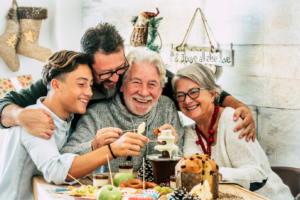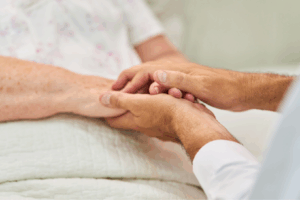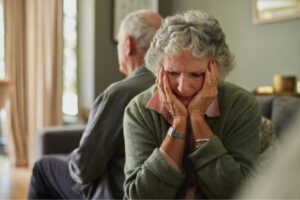When you’re taking care of a loved one – whether a family member, friend or neighbor – you might not consider yourself a “caregiver.” But according to the National Alliance for Caregiving and AARP, the reality is that approximately 34.2 million Americans provided unpaid care to an adult age 50 or older in the last 12 months.
Even if you are an informal caregiver, helping those we love remain independent requires patience, strength, and consistency. However those who provide care often neglect their own well-being: 67% of support providers report experiencing caregiver burnout, which is defined as a state of physical, mental, and emotional exhaustion.
At Institute on Aging, we understand the toll and inherent complexity that comes with caring for aging adults. Beyond the physical exertion and mental stress, a deeply complex emotional component must be met and managed.
We built IOA Home Care – also known as Corio – and our community support programs to meet the needs of aging adults and caregivers alike.
Defining Caregiver Burnout
Caregiver burnout occurs when an individual fails to provide themselves with the necessary resources and rest to maintain their well-being.
It’s easy to see how this occurs. Caregivers prioritize the needs of others at such a high level that they end up neglecting their own. Meals are missed, sleep schedules shortened and scattered, and soon their ability to care for themselves and others diminishes.
IOA designed Corio with these risks in mind and provides the break all caregivers need at some point. By being able to take time off from caregiving, but knowing their loved ones are still receiving the care they require, the likelihood of burnout occurring decreases.
Whether you are concerned for yourself or another being at risk for caregiver burnout, here are some common examples of the condition:
- Physical
- Fatigue and headaches
- Weakened immune system
- Irregular or difficult sleep
- Neglecting personal hygiene
- Mental
- Increased irritability
- Intense mood swings
- Cognitive difficulties like mental fog
- Social
- Withdrawal from personal hobbies
- Decreased work performance
- Resentment towards those within care
While any one sign in isolation might not be cause for alarm, if you notice several or increased severity of these developments, then it’s time to take steps to manage the risk effectively.
Managing Caregiver Burnout Risk
Creating a schedule with built-in breaks and viewing these not as a luxury, but as a necessity, helps ensure caregivers feel comfortable during their breaks and can receive the rest they need. With programs like Corio, these breaks can be changed as needed to fit the caregiver’s schedule.
Knowing they are not the lone support for their loved one helps relieve the pressure of caregiving, and when they need help, professionals like the IOA Home Care staff are accessible.
After all, there are limits to the amount of time and energy an individual can offer. Building a caregiving network of family, friends, and professionals helps meet the varied needs of aging adults with social engagement and stimulating activities.
With IOA Home Care, caregivers can schedule assistance as needed to give themselves an opportunity to recharge while remaining assured that their loved ones are still receiving the support they need.
Working Within Natural Limits
Recognizing and working within natural limits allows caregivers to manage situations beyond their individual capacity.
With IOA Home Care, we provide relief for all those needing a helping hand throughout the caregiving process. For every situation, there is an answer, and it all begins with having a simple conversation about how best to provide care for those we love.
Informal caregivers play a vital role in the support network that helps their loved ones remain independent and fulfilled at every stage of life. Preventing caregiver burnout with individualized, all-inclusive support plans like Corio makes it easier for caregivers to attend to their own needs. When they return, caregivers are then better rested and able to provide care to those they love.





